Detailed explanation of steps to develop react project
This time I will give you a detailed explanation of the steps to develop a react project, and what are the precautions for developing a react project. The following is a practical case, let's take a look.
1. Introduction
When developing a react application, no one should use the traditional method to introduce the react source file (js) and then edit it in html.
Everyone uses webpack es6 combined with react to develop front-end applications.
At this time, we can manually use npm to install various plug-ins to build the environment from beginning to end.
For example:
1 2 3 |
|
Although the process of building it yourself is also a good learning process, sometimes it is inevitable to encounter various problems, especially for beginners, and each time a new application is developed , it would be too cumbersome to build it from scratch.
So, someone developed a scaffolding based on their own experience and best practices to avoid reinventing the wheel and doing useless work during the development process, thus saving development time.
I scanned the internet for scaffolds similar to this that many people use and pay attention to, and found three in total. They are:
react-boilerplate
react-redux-starter-kit
create-react-app
Their attention The volume is very large. As of writing this article, the number of stars on github is as follows:



It can be seen that using these three There are quite a few people working on scaffolding, the most prominent one is create-react-app.
It is coming from behind. Its development time is later than the first two, but it has more attention than them, and it is also officially developed by Facebook.
It is definitely an excellent product.
Let’s introduce its characteristics below.
2. Features
It has many advantages, let’s start with installation and use.
2.1 Simple installation and use
create-react-app is really easy to install. It only requires one command. Unlike other scaffolding, you need to clone it. The source code of the entire scaffolding is modified based on that.
1 |
|
After installation, to generate a new project, you can use the following command:
1 2 |
|
has created the my-app directory. At this time, use the following command You can start developing applications.
1 |
|
By default, a server will be started in the development environment, listening on port 3000. It will actively open the browser for you, and you can see the effect of the app immediately.
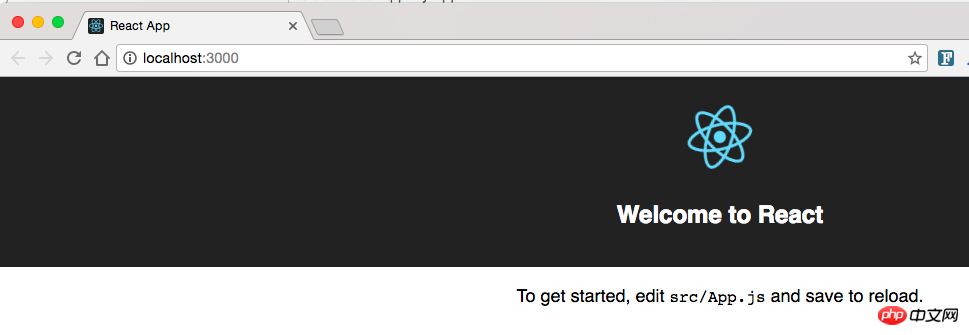
Is not it simple?
2.2 The source code structure is simple and clear
In the project my-app directory, you will find that the source code is very clear and there are no redundant files.
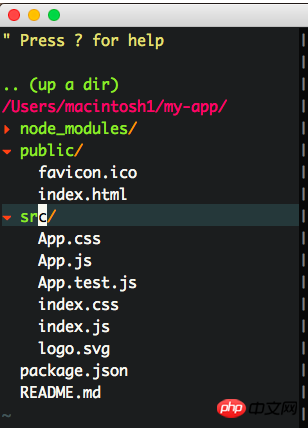
It’s really refreshing. You will put all the source code in the src directory. You don’t need to worry about any configuration files or all kinds of mess. You just Just focus on development, create-react-app will take care of it for you.
The entire source code is simple, small and refreshing! It’s also easy to manage!
If you have used webpack-dev-server or webpack to build a development environment, you will find that create-react-app The development environment also has an automatic refresh function similar to webpack-dev-server's --inline --hot.
What does that mean?
Once the source code file is updated and saved, the browser will automatically refresh, allowing you to view the effect in real time.
You always have to explore what’s going on. Could it be that create-react-app also uses webpack-dev-server?
I looked through the source code and couldn't find the webpack.config.js file. If you use webpack, you should have this file. It's strange.
看了一下node_modules目录,也没找到webpack相关的东西。
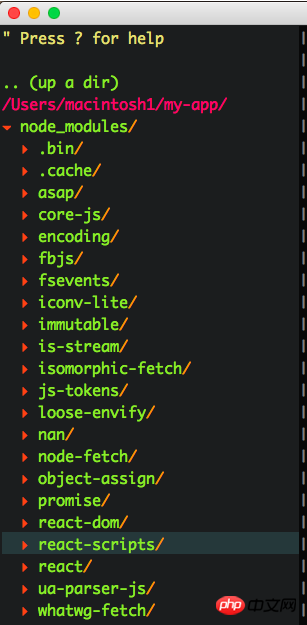
先源头入手,我是用npm start命令来运行项目的。
就从package.json文件入手,它的内容是这样的:
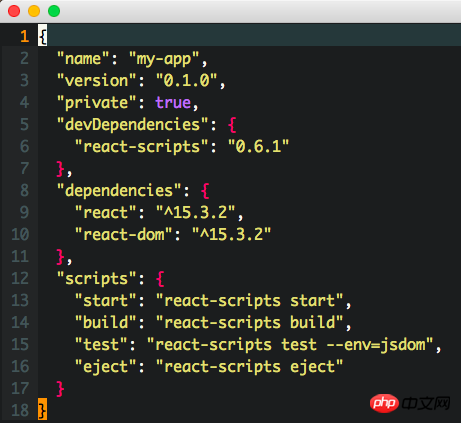
看到了这行:
1 |
|
react-scripts又是什么?
在node_modules目录中能找到它,它果然依赖了好多工具,其中就包括'webpack'。
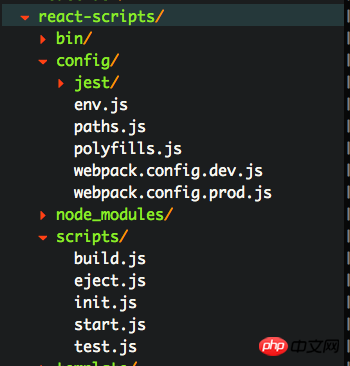
里面果然也有webpack的配置文件,也有好多脚本文件。
原来它是facebook开发的一个管理create-react-app服务的工具。
原来也是它让整个源码变得很整洁的。
因为它隐藏了没必要的文件,大多数人的配置都是差不多的。
除此之外,它还加入了eslint的功能。让你在开发过程中,更关注于代码,很不错。
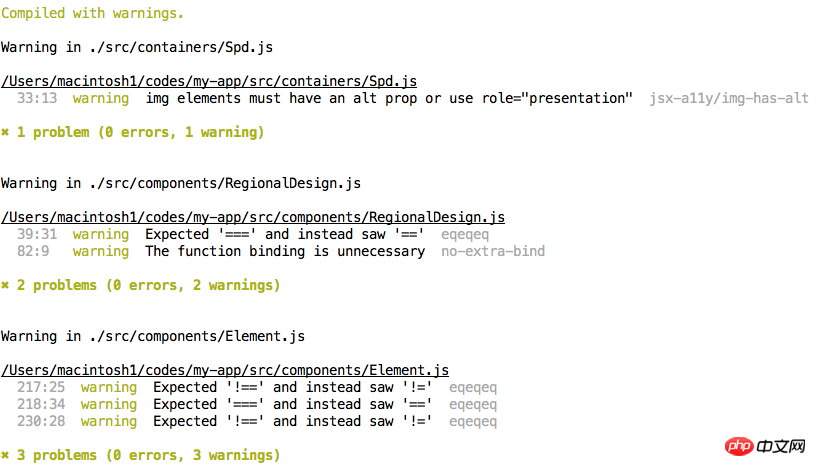
2.3线上编译命令
这个是create-react-app的一个大亮点,它能让你的应用骗译出在线上生产环境运行的代码,编译出来的文件很小,且文件名还带hash值,方便我们做cache,而且它还提供一个服务器,让我们在本地也能看到线上生产环境类似的效果,真的超级方便。
只需一行命令:
1 |
|
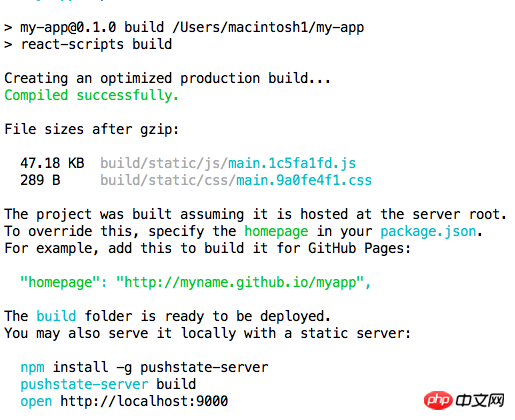
运行下面两条命令,可以查看线上生产环境的运行效果。
1 2 |
|
编译好的文件都会放到build目录中。
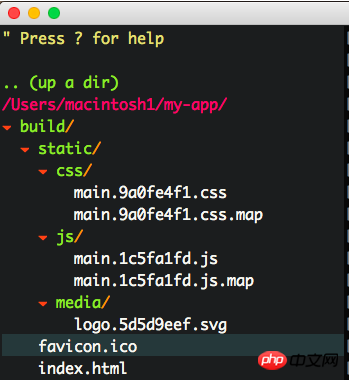
2.4 api开发
在开发react应用时,难免与服务器进行数据交互,就是要跟api打交道。
这个时候,有一个问题。
api存在的服务器可能是跟react应用完全分开的,而且,开发环境跟线上环境又不太一样。
比如,开发环境中,你的react应用是跑在3000端口的,可是api服务可能跑在3001端口,这个时候,你跟api服务器交互的时候,可能会使用fetch或各种请求库,比如jquery的ajax。
这个时候可能会遇到CORS问题,毕竟端口不同,而线上环境却没有这个问题,因为你都控制线上环境的react应用和api应用,跑在同一个端口上。
按照以往思路,解决的方法可能是用环境变量,比如:
复制代码 代码如下:
const apiBaseUrl = process.env.NODE_ENV === 'development' ? 'localhost:3001' : '/'
但是这样搞起来,还是有些复杂,然而,create-react-app提供了一个超级简单的方法,只需要在package.json文件中,加一个配置项就可以了。
比如:
1 |
|
至于你用的是http的何种请求库,都是一样的,不用改任何代码。这个选项,只对开发环境有效,线上环境还是保持react应用和api应用同一个端口。
相信看了本文案例你已经掌握了方法,更多精彩请关注php中文网其它相关文章!
推荐阅读:
The above is the detailed content of Detailed explanation of steps to develop react project. For more information, please follow other related articles on the PHP Chinese website!

Hot AI Tools

Undresser.AI Undress
AI-powered app for creating realistic nude photos

AI Clothes Remover
Online AI tool for removing clothes from photos.

Undress AI Tool
Undress images for free

Clothoff.io
AI clothes remover

Video Face Swap
Swap faces in any video effortlessly with our completely free AI face swap tool!

Hot Article

Hot Tools

Notepad++7.3.1
Easy-to-use and free code editor

SublimeText3 Chinese version
Chinese version, very easy to use

Zend Studio 13.0.1
Powerful PHP integrated development environment

Dreamweaver CS6
Visual web development tools

SublimeText3 Mac version
God-level code editing software (SublimeText3)

Hot Topics
 1663
1663
 14
14
 1420
1420
 52
52
 1315
1315
 25
25
 1266
1266
 29
29
 1239
1239
 24
24
 How to perform real-name authentication on Jingdong Mall APP
Mar 19, 2024 pm 02:31 PM
How to perform real-name authentication on Jingdong Mall APP
Mar 19, 2024 pm 02:31 PM
How to get real-name authentication on Jingdong Mall APP? Jingdong Mall is an online shopping platform that many friends often use. Before shopping, it is best for everyone to conduct real-name authentication so that they can enjoy complete services and get a better shopping experience. The following is the real-name authentication method for JD.com, I hope it will be helpful to netizens. 1. Install and open JD.com, and then log in to your personal account; 2. Then click [My] at the bottom of the page to enter the personal center page; 3. Then click the small [Settings] icon in the upper right corner to go to the setting function interface; 4. Select [Account and Security] to go to the account settings page; 5. Finally, click the [Real-name Authentication] option to fill in the real-name information; 6. The installation system requires you to fill in your real personal information and complete the real-name authentication
 Steps and precautions for registering a Hong Kong Apple ID (enjoy the unique advantages of the Hong Kong Apple Store)
Sep 02, 2024 pm 03:47 PM
Steps and precautions for registering a Hong Kong Apple ID (enjoy the unique advantages of the Hong Kong Apple Store)
Sep 02, 2024 pm 03:47 PM
Apple's products and services have always been loved by users around the world. Registering a Hong Kong Apple ID will bring more convenience and privileges to users. Let’s take a look at the steps to register a Hong Kong Apple ID and what you need to pay attention to. How to register a Hong Kong Apple ID When using Apple devices, many applications and functions require using Apple ID to log in. If you want to download applications from Hong Kong or enjoy the preferential content of the Hong Kong AppStore, it is very necessary to register a Hong Kong Apple ID. This article will detail the steps on how to register a Hong Kong Apple ID and what you need to pay attention to. Steps: Select language and region: Find the "Settings" option on your Apple device and enter
 Integration of Java framework and front-end React framework
Jun 01, 2024 pm 03:16 PM
Integration of Java framework and front-end React framework
Jun 01, 2024 pm 03:16 PM
Integration of Java framework and React framework: Steps: Set up the back-end Java framework. Create project structure. Configure build tools. Create React applications. Write REST API endpoints. Configure the communication mechanism. Practical case (SpringBoot+React): Java code: Define RESTfulAPI controller. React code: Get and display the data returned by the API.
 Blackmagic\'s pro-level video app lands on Android, but your phone probably can\'t run it
Jun 25, 2024 am 07:06 AM
Blackmagic\'s pro-level video app lands on Android, but your phone probably can\'t run it
Jun 25, 2024 am 07:06 AM
Blackmagic Design has finally brought its well-praised Blackmagic Camera app to Android. The professional video camera app is free to download, and it offers complete manual controls. These controls aim to make it easier for you to take pro-level cin
 Vue.js vs. React: Project-Specific Considerations
Apr 09, 2025 am 12:01 AM
Vue.js vs. React: Project-Specific Considerations
Apr 09, 2025 am 12:01 AM
Vue.js is suitable for small and medium-sized projects and fast iterations, while React is suitable for large and complex applications. 1) Vue.js is easy to use and is suitable for situations where the team is insufficient or the project scale is small. 2) React has a richer ecosystem and is suitable for projects with high performance and complex functional needs.
 China's mobile Internet users will exceed 1.232 billion in 2024, and WeChat's monthly active users will exceed 1 billion to lead the list
May 08, 2024 pm 04:10 PM
China's mobile Internet users will exceed 1.232 billion in 2024, and WeChat's monthly active users will exceed 1 billion to lead the list
May 08, 2024 pm 04:10 PM
According to the latest "2024 China Mobile Internet Spring Report" released by QuestMobile, as of March 2024, the number of monthly active users of my country's mobile Internet has reached 1.232 billion, an increase of more than 20 million users compared with the same period last year. This significant growth reflects the strong development momentum of China's mobile Internet market. In addition, QuestMobile also compiled a list of APPs with the largest user base in the TOP50 track based on the average monthly active user size for the three months in the first quarter of 2024. The list covers 50 sub-industries and selects the apps with the most active users in each industry. However, applications in specific categories such as game platforms and app stores are not included in this ranking. data
 React's Role in HTML: Enhancing User Experience
Apr 09, 2025 am 12:11 AM
React's Role in HTML: Enhancing User Experience
Apr 09, 2025 am 12:11 AM
React combines JSX and HTML to improve user experience. 1) JSX embeds HTML to make development more intuitive. 2) The virtual DOM mechanism optimizes performance and reduces DOM operations. 3) Component-based management UI to improve maintainability. 4) State management and event processing enhance interactivity.
 Users encounter obstacles in installing third-party apps. Lawyer's opinion: Manufacturers block external links, which is suspected of constituting monopolistic behavior
Apr 27, 2024 pm 04:58 PM
Users encounter obstacles in installing third-party apps. Lawyer's opinion: Manufacturers block external links, which is suspected of constituting monopolistic behavior
Apr 27, 2024 pm 04:58 PM
Thanks to netizen Soft Media New Friend 1933769 for submitting clues! According to news on April 27, the Rule of Law Daily recently published a report "Does the next app need the consent of the mobile phone manufacturer?" ”, the article describes the problems encountered during the installation of the App from the perspectives of multiple users. Some lawyers believe that the manufacturer intercepts external links and is suspected of constituting monopolistic behavior. Risk warnings popped up repeatedly, and downloading and installation were blocked many times. Ms. Li wanted to download and install the App from third-party channels, but encountered many restrictions such as security risk warnings and entering system passwords. Taking Mr. Guo from Chaoyang District, Beijing, as an example when installing a mobile game, he will encounter the problem of repeated pop-ups of risk warnings and blocked download and installation many times. The installation restrictions are as follows: 1. Search and download a mobile game App in the browser 2. After clicking "Download Now",




